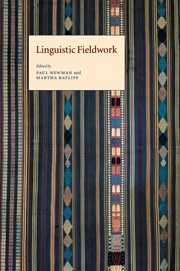Book contents
- Frontmatter
- Contents
- List of figures
- List of tables
- Notes on contributors
- Introduction
- 1 Fieldwork as a state of mind
- 2 Who shapes the record: the speaker and the linguist
- 3 Places and people: field sites and informants
- 4 Ulwa (Southern Sumu): the beginnings of a language research project
- 5 Escaping Eurocentrism: fieldwork as a process of unlearning
- 6 Surprises in Sutherland: linguistic variability amidst social uniformity
- 7 The role of text collection and elicitation in linguistic fieldwork
- 8 Monolingual field research
- 9 The give and take of fieldwork: noun classes and other concerns in Fatick, Senegal
- 10 Phonetic fieldwork
- 11 Learning as one goes
- 12 The last speaker is dead – long live the last speaker!
- Index
9 - The give and take of fieldwork: noun classes and other concerns in Fatick, Senegal
Published online by Cambridge University Press: 05 June 2012
- Frontmatter
- Contents
- List of figures
- List of tables
- Notes on contributors
- Introduction
- 1 Fieldwork as a state of mind
- 2 Who shapes the record: the speaker and the linguist
- 3 Places and people: field sites and informants
- 4 Ulwa (Southern Sumu): the beginnings of a language research project
- 5 Escaping Eurocentrism: fieldwork as a process of unlearning
- 6 Surprises in Sutherland: linguistic variability amidst social uniformity
- 7 The role of text collection and elicitation in linguistic fieldwork
- 8 Monolingual field research
- 9 The give and take of fieldwork: noun classes and other concerns in Fatick, Senegal
- 10 Phonetic fieldwork
- 11 Learning as one goes
- 12 The last speaker is dead – long live the last speaker!
- Index
Summary
The world is like a Mask, dancing. If you want to see it well you do not stand in one place.
Chinua Achebe, Arrow of GodThe narratives that follow are an attempt to convey two perspectives, that of the linguist (Mc Laughlin) and that of the “informant” (Sall), on a particular moment of linguistic fieldwork carried out in Fatick, Senegal in 1989. The text has come together from conversations both tape recorded and remembered, written drafts and translations of drafts, and individual readings and critiques by each of the authors. During the process of discussing and writing these dual narratives we have had to confront the issues and problems of ethnographic representation in a very direct manner since we have, in a sense, entered into a dialogue about the representation of ourselves and each other. On several occasions we thought that we were undertaking an impossible task because the challenges of such representation seemed to be overwhelming. We have not solved them, we are merely more aware of them than ever. Perhaps the ambivalence of our perspective can best be conveyed through a conversation we had in Dakar in July, 1998.
sall: Somehow one has the impression that we are always the object and never the subject. We are the ”material” that toubabs come to study.
mc laughlin: But this time, by presenting your own narrative, don't you think that you have an opportunity to be the subject instead of the object?
sall: (Laughter). I'll talk about myself, but only at your initiative. So where does that put us?
- Type
- Chapter
- Information
- Linguistic Fieldwork , pp. 189 - 210Publisher: Cambridge University PressPrint publication year: 2001
- 12
- Cited by



